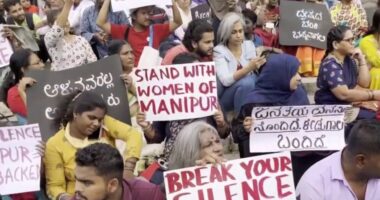Luz Gallegos stood in a Hemet, Calif., orange grove last month and asked for a show of hands among the farmworkers assembled there: How many of you want a Covid-19 vaccine? No hands went up.
Ms. Gallegos said her team of health workers from Latino advocacy organization Todec have done hundreds of vaccine education events like this in southern California since early October to encourage agricultural workers to get the shots. Each time, she said, the health workers encounter broad reluctance. They must disabuse the agricultural workers of vaccine myths that are circulating—including a common one that the shots contain a microchip to help the government trace and deport undocumented workers.
Community health workers like the Todec team are working across the U.S. to reach some of the millions of Latinos laboring on farms and in meatpacking and poultry plants, a group that is at once among the most vulnerable to Covid-19 and yet more reluctant than others to get vaccinated.
The health workers are battling a deluge of vaccine misinformation spread among agricultural workers’ friends and family as well as in churches and on social media. The health workers point to Facebook, in particular, saying posts often discourage the shots by amplifying widespread distrust of immigration authorities or exploiting religious beliefs.
The health workers’ efforts may be crucial to bringing a swift end to the pandemic, given the spread of the virus in this community. Scientists warn that any delay in vaccinations could give rise to variants that are more transmissible, lethal or resistant to existing vaccines. California has given priority to food and agricultural workers for early doses.

Community health workers like the Todec team are battling vaccine misinformation.
Photo: Jessica Pons for The Wall Street Journal
Agricultural workers are vulnerable because many work in close quarters in food-packing facilities or in meat and poultry processing plants. Many commute together or live in multigenerational or multifamily homes, which helps the virus spread.
A study of excess deaths in California among working-age adults by job category showed that Latinos died at higher rates across most categories. The heavily Latino food and agriculture sector was hit hardest, suffering a 59% increase in mortality from March to October last year. Overall mortality rose 22%, the study showed. Nationally, Covid-19 death rates are 2.3 times higher for Latinos than for whites, according to the Centers for Disease Control and Prevention.
When offered a shot at a vaccine event in a Fresno, Calif., orchard in February, a handful of agricultural workers declined. One worker said he didn’t need the vaccine because he felt healthy and took care of himself. Another worried that side effects might aggravate his asthma. Some mentioned a conspiracy theory—that the mass vaccination effort is an attempt to cull the population.
Agricultural workers’ reluctance stems in part from fears that any side effects would necessitate medical care, resulting in bills these workers can’t afford or debt that could complicate applications for legal residency, said Alma Moreno, a farmworker who previously caught Covid-19 and opted to get vaccinated in Fresno that day.
Agricultural workers’ hesitancy is reflected in the broader Latino community. A February poll by the Kaiser Family Foundation showed that 48% of Latino adults either didn’t want the vaccine, preferred to wait or would take it only if required for work, school or other activities, compared with 37% for whites and 44% for the population overall. The figure for Latinos has fallen from 72% in December. The foundation projects that hesitancy will continue to fall as more people see their friends and family vaccinated safely.

‘Every time we’re out in the community educating people about the vaccine, we’re debunking a lot of myths,’ said Luz Gallegos.
Photo: Jessica Pons for The Wall Street Journal
“Every time we’re out in the community educating people about the vaccine, we’re debunking a lot of myths,” said Ms. Gallegos, who said she had lost three relatives and five close friends to Covid-19.
Besides the tracking chip fallacy, other myths hold that the vaccine will make women infertile, that it contains live virus and that it will sicken or kill recipients, rewrite their DNA or change their gender. Another says the vaccine tags people with the “mark of the beast,” a reference to the New Testament’s Book of Revelation.
A March 3 analysis of Covid-19 vaccine misinformation on Facebook prepared for The Wall Street Journal by social-media research firm Storyful found more than 100,000 Spanish-language posts that appeared to reference the vaccine microchip conspiracy theory. That was more than twice as many as in English and an increase since early February, when Facebook said it would remove more vaccine misinformation along with groups and accounts that spread it.
One post by an Ohio-based evangelical preacher linked the vaccine to the “mark of the beast” before calling it part of a plot for world domination by global elites like Bill Gates. The post has been shared more than 22,000 times.
A Facebook spokeswoman said the company has removed or labeled millions of posts on Facebook that violate its Covid-19 and vaccine misinformation policies, including content in Spanish. She said the Storyful analysis also includes some posts that warn against the vaccine microchip conspiracy theory rather than seek to spread it. Facebook deleted the Ohio preacher’s video for violating its misinformation policy after the Journal inquired about it. The spokeswoman didn’t say why it wasn’t removed previously.
Undocumented Latinos are especially reluctant to get vaccinated, community health workers said. Even before the pandemic, many avoided doctors because they feared they would run afoul of the “public charge” rule, which the government can use to disqualify poor and disabled people from receiving permanent legal status if it determines they can’t support themselves without public assistance. Online misinformation fuels these fears with claims that the vaccine will cause serious side effects or necessitate medical care, healthcare workers said.
The Trump administration toughened the public charge rule in 2019. U.S. Citizenship and Immigration Services said last year it wouldn’t count Covid-19 testing or treatment against undocumented workers who seek legal status, a message that didn’t reach many workers who are still afraid to seek treatment. President Biden has ordered a review of public charge policy.
SHARE YOUR THOUGHTS
What more should be done to encourage vaccination? Join the conversation below.
“People [with Covid-19] are just scared to go to the doctor because of public charge,” Todec’s Ms. Gallegos said.
A study published Friday in the journal JAMA Network Open linked anti-immigrant rhetoric during the 2016 election to a decline in primary-care visits by undocumented immigrants.
In California, Maria Garcia, a 75-year-old undocumented former agricultural worker, tested positive for Covid-19 in January but hasn’t sought medical care, including for brain fog and other lingering symptoms. She lacks health insurance and fears any healthcare expenses could jeopardize her pending immigration application or cause her to be deported. She is also hesitant to get the vaccine, she said, and doesn’t trust the government to keep Covid-19 and immigration issues separate.
“You’re always afraid,” said Ms. Garcia.
Florida asks for proof of residency for vaccination, like a utility bill or bank statement, a potential deterrent for undocumented agricultural workers in the state. In Nebraska, where meatpacking plants with large immigrant workforces were hit especially hard by Covid-19, Gov. Pete Ricketts said in January that he didn’t expect undocumented workers to be part of his state’s vaccination program. The state now says proof of citizenship won’t be required.
Gov. Ricketts’s comment scared undocumented workers, said Vivian Garcia, an outreach manager at OneWorld Community Health Centers Inc. in Omaha. Ms. Garcia has promoted the vaccine to workers in heavily Latino food packaging and processing plants, where many workers fear threats to their own or a family member’s legal status.
Ms. Garcia also battles misinformation. Some told her they’d heard that “if you don’t get the second dose, you’ll be followed,” said Ms. Garcia, who initially was afraid to get the shot because it was developed so quickly. Talking to OneWorld doctors who had participated in vaccine clinical trials reassured her it was safe.
“There’s bad information in our community,” she said. “Our clinic has tried to do a lot to make sure people don’t believe these lies”—for example, running a hotline for vaccine-related questions so that people have access to reliable information.
A Biden administration spokesman said a mass advertising campaign to promote the vaccine is in the works but declined to offer specifics.
First-person accounts are critical to battling vaccine hesitancy, health workers said, especially because of a lack of reliable information among farmworker communities.
“No one had come here to explain anything [about the vaccine], at least not anyone who really knows anything about it,” said Ezequiel Chavez, an Ontario, Calif., farmworker.
After outreach workers from Todec, including Ms. Gallegos, explained how the vaccine works, how it is administered and how they’d felt after getting vaccinated, Mr. Chavez decided to get the vaccine. He got his first shot in late February.
Write to Rolfe Winkler at [email protected] and Daniela Hernandez at [email protected]
Copyright ©2020 Dow Jones & Company, Inc. All Rights Reserved. 87990cbe856818d5eddac44c7b1cdeb8













